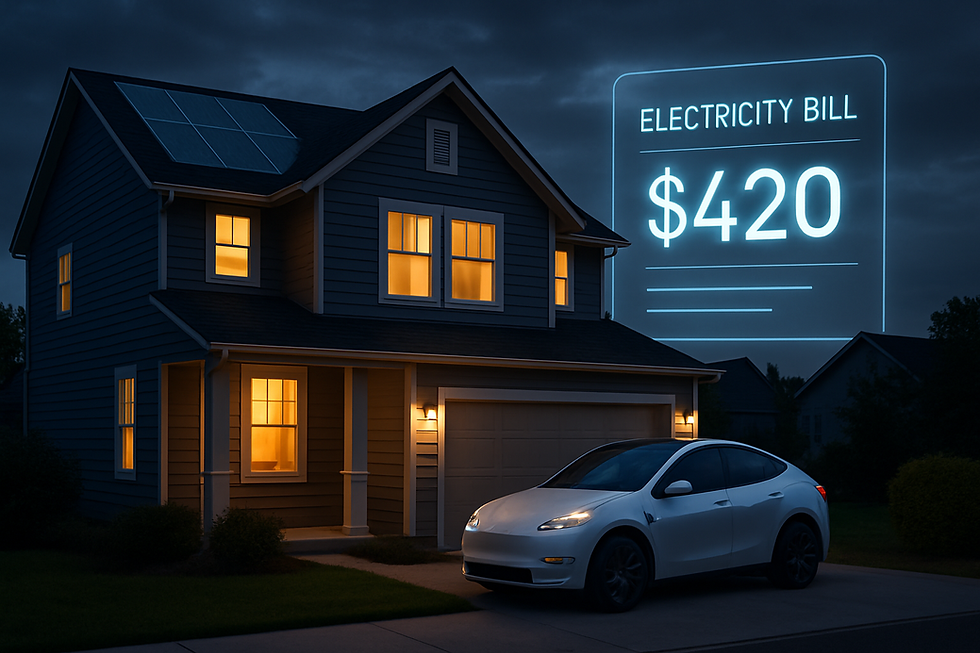Your EV Is About to Cost You $3,000+ More (The Solar Solution No One's Talking About)
- IntegrateSun Company
- Aug 7, 2025
- 4 min read

We recently analyzed an EV owner's electricity bill in Austin and discovered they're losing $4,200 every year. They bought a Tesla Model Y to save money, but their electric bill jumped from $160 to $420 per month. This isn't an isolated case; it's happening to EV owners across the country, and most don't realize there's a simple solar solution that can cut EV charging costs by 89%.
If you drive electric or you're considering making the switch, this analysis could save you more money than any other investment you make this year.
One of Our Customers’ Impact: The Martinez Family in Dallas
Before purchasing their EV, the Martinez family's electric bill averaged $180 per month for 1,200 kWh of usage. After bringing home their Tesla Model Y, their bill skyrocketed to $450 per month, 2,400 kWh total usage. That's an increase of $270 per month, or $3,240 per year just for EV charging.
Unfortunately, this scenario is becoming the norm rather than the exception.
The National EV Charging Cost Reality
The average EV adds 300-400 kWh monthly to your electric bill. Nationally, this translates to an extra $64-$80 per month, but in high-rate states, the impact is far more severe:
California: $126/month average increase
Texas: $93/month average increase
Florida: $89/month average increase
Another Case Study: The Chen Family's $4,596 Annual Shock
Consider the Chen family in Sacramento, who drive a Tesla Model 3 requiring 25 kWh daily for charging. They're on PG&E's time-of-use plan, where peak hours (4-9 PM) cost $0.51 per kWh.
When they charge during peak hours, that's:
$12.75 per day
$383 per month
$4,596 per year just for EV charging
That's more than they used to spend on gasoline—defeating the entire purpose of going electric.
The Solar Solution Most People Don't Know About

Proper EV Solar Sizing: The Missing Piece
Most solar calculators completely ignore EV charging requirements, leading to massive undersizing mistakes. Here's the correct methodology:
Step 1: Calculate Your EV's Real Daily Energy Need
Tesla Model Y efficiency: 28 kWh per 100 miles
Average daily driving: 40 miles
Daily energy requirement: 11.2 kWh
Step 2: Account for Charging Losses AC charging is only 85-90% efficient, so your real daily need is:11.2 kWh ÷ 0.88 = 12.7 kWh per day
Step 3: Solar Panel Requirements by State
State | Peak Sun Hours | 400W Panels Needed | System Size |
Texas | 5.2 hours | 6 panels | 2.4kW |
California | 5.8 hours | 5 panels | 2.0kW |
Florida | 5.1 hours | 6 panels | 2.4kW |
Arizona | 6.5 hours | 5 panels | 2.0kW |
The $40,000+ Savings Breakdown
15-Year Financial Analysis: Austin Tesla Owner
Without Solar:
Annual charging cost: $3,240 (at current $0.18/kWh rates)
With 3% annual rate increases: $58,234 total over 15 years
With 6kW Solar System:
System cost: $18,000 (after 30% federal tax credit)
Annual EV charging cost: $0 (fully solar-offset)
Net profit over 15 years: $40,234
Return on Investment: 4.2-year payback period with a 223% ROI
The 3 Most Expensive EV Solar Mistakes
Mistake #1: Under sizing for Peak Charging Rates
The Error: Most people size solar for average daily usage. The Reality: You must size for your utility's time-of-use rates and peak charging windows. The Cost: $1,500-$3,000 annual losses in potential savings.
Mistake #2: Ignoring Future EV Growth
The Statistic: 67% of EV households purchase a second electric vehicle within three years. The Planning: Size your system for 1.5-2 EVs from day one. The Penalty: System expansion later costs 40% more than building correctly initially.
Mistake #3: Wrong Battery Integration
The Problem: Solar produces power during the day; most people charge EVs at night . The Solution: 15-20kWh battery storage minimum for EV house holds. The Loss: Without storage, you forfeit 60-80% of potential EV charging savings.
Geographic Opportunities Across Our Service Areas

California: Maximum Arbitrage Opportunity
$0.43/kWh arbitrage potential between peak and off-peak rates
NEM 3.0 makes battery storage essential
Average EV solar ROI: 3.1 years
Texas: Perfect Self-Consumption Match
No net metering = 100% self-consumption requirement
EV charging perfectly matches solar production timing
ERCOT peak pricing makes batteries profitable standalone
Florida: Hurricane Resilience + Growth
EV doubles as backup power during outages
No state income tax maximizes federal tax credit value
47% EV growth in 2025 creates expanding market
Take Action: Your EV Solar Assessment
At IntegrateSun, we've developed a comprehensive EV Solar Assessment that goes far beyond typical solar consultations:
Our Process
Load Analysis: Monitor your actual EV charging patterns for 2 weeks
Rate Optimization: Design system to match your utility's specific time-of-use structure
Future Planning: Size for additional EVs and home electrification
ROI Guarantee: Calculate exact payback periods using your real data
Ready to Stop Losing Money on EV Charging?
If you live in California, Texas, Florida, Arizona, Colorado, Georgia, Oklahoma, Pennsylvania, Maryland, South Carolina, or Washington DC, IntegrateSun will analyze your EV charging costs completely free.
Why Choose IntegrateSun for EV Solar Integration?
11-State Expertise: Deep knowledge of local utility rates, incentives, and grid conditions
EV Specialization: We understand the unique requirements of solar-EV integration
Certified Tesla Partner: Direct access to Powerwall and charging solutions
Proven Track Record: Over $2 million in EV charging savings delivered to customers
Driving electric should save you money, not cost you thousands. We're here to ensure your EV investment actually pays off.
Ready to reclaim your energy independence?



